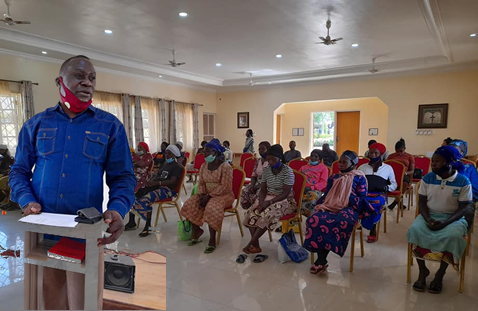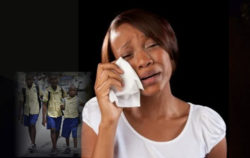Challenges facing Northern Nigeria are so many that it would be unrealistic to think governments alone can tackle and assist them. The northern Christians are perhaps the biggest casualty in the North. They face constant persecutions, killings, deprivations, etc. The northern Christians are more disappointed because, according to them, they get little or no support from their siblings in faith – Christians in  Southern Nigeria.
Southern Nigeria.
One of the private foundations in Northern Nigeria assisting the less privileged and the displaced people is Stefanos Foundation, a Christian Faith-Based Non-Governmental Organisation founded by Mark Lipdo, a Christian Rights Activist based in Jos, Plateau State.
In this interview with E-life, Lipdo responds to questions on the killings in the Middle Belt region, the havoc by the Fulani herdsmen, banditry in Northern Nigeria, and the perception that Christians in Southern Nigeria do not bother about the plight of Christians in Northern Nigeria.
From the findings of your Foundation, what is the source of these ethnic challenges and killings in the North, particularly in the Middle Belt?
There are a lot of narratives, excuses, and justifications. Still, at the end of it all, it boils down to intolerance, whether tribal, religious, or even political, coupled with a superiority complex that is protected at the expense of unity, peace, and progress of the society. The sources of these challenges include:
– call for full implementation of sharia law in Northern Nigeria as against the Nigeria constitution.
– Islam extremists ideology and terrorism (Boko Haram, Fulani Militia, Armed bandits, and other terrorist groups)
– violations of fundamental human rights of Christians in the North (marginalisation, discrimination, etc.)
– Islamic take over agenda (ethnic cleansing and ancestral land grabbing)
The current cries all over Nigeria are about Fulanisation of Nigeria by President Mohammadu Buhari and his Fulani siblings. Can these cries be justified?
The facts and reality on the ground speak for themselves. There are a lot of reports of killings of farmers, farming communities, and so on by militant Fulani herdsmen.
Many kidnap victims say that their captors are primarily Fulani, and there were times that MACBAN came out to claim responsibility for attacks. Several States in Nigeria have put in place anti-grazing laws and all that.
This certainly cannot be without cause. The Security chiefs are mainly from that area, and so, anyone listening to news and happenings on the ground can easily make their judgment whether it’s true or not.
Many have come to believe that there is a Fulanization agenda of Buhari – appointment of only Muslims of Northern Hausa-Fulani extraction into key government sector positions – security, oil, finance, communications, revenue mobilisation, etc.
The news we hear down south is that the IDP camps are being used to siphon money, and if Government wants to stop the Boko Haram insurgency, they will in a few days. Is this true?
There are no excellent efforts that are not abused or criticised. We have run IDPs camp, and we know that even the best intentions can be misunderstood.
Having said that, the allegations may not be entirely false, but we should not be unmindful of the fact that hundreds of thousands of people have been displaced from their homes, their sources of livelihood destroyed, families brutalised, separated, or many members lost.
They need to be accommodated, helped, and rehabilitated. We would imagine that this should be the priority.
As for ending Boko Haram, it appears that the Government does not have the political will and is sympathetic to the cause of Boko Haram. Former Head of State, General Sani Abacha, once said…
If insurgency lasted 48 hours, it means Government is involved. If the current Government wants to end insurgency and banditry in the country, they can do so in no time.
Moreover, former president Goodluck Jonathan achieved it within a month when he launched military operations against Boko Haram to take back all the eight LGAs taken by terrorists to form their caliphate in 2015.
Now, it’s banditry all over the North. Do you see an end to all these? If you are to advise this Government, what would you tell them?
Yes, banditry is all over the North, and the payments of ransom by the Government encourage them. Fulani bandits also confessed that Government supplies them with weapons and shields them from any military action, as reported in many quarters.
It is unlikely that banditry would end anytime soon as it is now a very lucrative emerging industry in Nigeria. They receive government protection and are exclusively identified to a particular ethnic group.
My advice to the Government would be to declare bandits as terrorists and authorise an effective and sustained military action to save Nigeria. The Government was able to find a way to bring in Nnamdi Kanu, whom they consider a threat, they were able to track down Sunday Igboho.
They have all they need to curb banditry at their disposal. They should make it a priority and deal with the situation squarely as any responsive government would do
In all of this, how can the Church of God assist? How do you rate the disposition of the Church to this challenge in the North?
The Church has done little to help mitigate this situation and rebuild the lives of the victims. This has resulted in many affected Christian families becoming destitute in their country.
There is no collective response from the Church to this situation. Although we might have seen some individual church responses in some places, they have not been effective. So, we can rate the Church to be below average in responding to the situation at hand.
The Church is in a time when it needs to be united like never before. The Church is responding, each on its direction and therefore duplicating efforts. There is a need to have a united effort.
There is a feeling among Northern Christians that Christians in the South do not care about their plight. Do you agree with this? Can you substantiate the feelings?
The perception used to be that the south sees the North as one tribe, totally oblivious that hundreds of tribal people are there.
That was the feeling; maybe it’s less so now that the problems have become nationwide. Still, the situation has made the south more active and aware, especially with the difficulties spreading across almost every state in the country.
The northern Christians have been overstretched and overwhelmed by the situation and have received very little or no requisite support from the southern Christians community. This is disappointing and discouraging.
The northern Church is the gateway and the wall against Islamic aggression to the southern Church. However, the southern Christians are oblivious of this fact, perhaps, the reasons for their inadequate response.
The cries in so many parts of Southern Nigeria are for the Balkanisation of Nigeria. How do you react to this? Should we break the country?
The feeling of injustice and dissatisfaction with the management of the commonwealth of Nigeria is the source of most of these agitations. Balkanisation of the country may solve some problems, but it will create other problems.
We would instead suggest that the key issues be identified and proper solutions preferred to tackling them as there will always be minorities, even among minorities.
Stefanos is a strong advocate of one Nigeria. However, we firmly believe that Nigeria needs critical reforms or restructuring that can further strengthen the country’s unity and encourage progress. Breaking the country may not solve the problems.
Tell us about yourself, your Christian walk with Christ, and your testimonies…
I am Mark Lipdo, a graduate of Building Technology from the University of Jos and a Nigerian Christian Rights Activist. I founded Stefanos Foundation, a Christian faith-based Non-Governmental Organisation to intervene in the persecution of Christians in Northern Nigeria.

Stefanos Foundation came alive on February 16, 2004, and it was registered as a Charity with the Nigerian Cooperate Affairs Commission on February 16th 2006. I was married to Elizabeth Lipdo, who passed on to eternity on September 1st 2019.
Stefanos Foundation will soon be working with the Christian Association of Nigeria to liberate Nigeria’s Christians and ethnic people. This research has recently come up with over 400 ethnic people in 19 Northern Nigeria.
We hope that if adequately mobilised, these people would sufficiently build a force that would stand up against the intimidating Islamic ideological warfare by the two dominant tribes of Hausa and Fulani that is now threatening the peaceful coexistence within the region.
What are the reasons for the Foundation?
We found the Foundation in 2002 to develop a non-violent approach to respond to the persecution of Christians in northern Nigeria.
The 2001 crisis in Jos, which gradually spread to other parts of Plateau and northern states of Nigeria, targeting Christian villages and churches, was a clear indication that Christians had been marked for annihilation in Nigeria by the Islamic world.
Thus, there was the need for an indigenous organisation that would respond to the needs of affected Christian families to enable them to survive and continue to live with love and forgiveness in their hearts toward the perpetrators.
[Best_Wordpress_Gallery id=”45″ gal_title=”north”]









